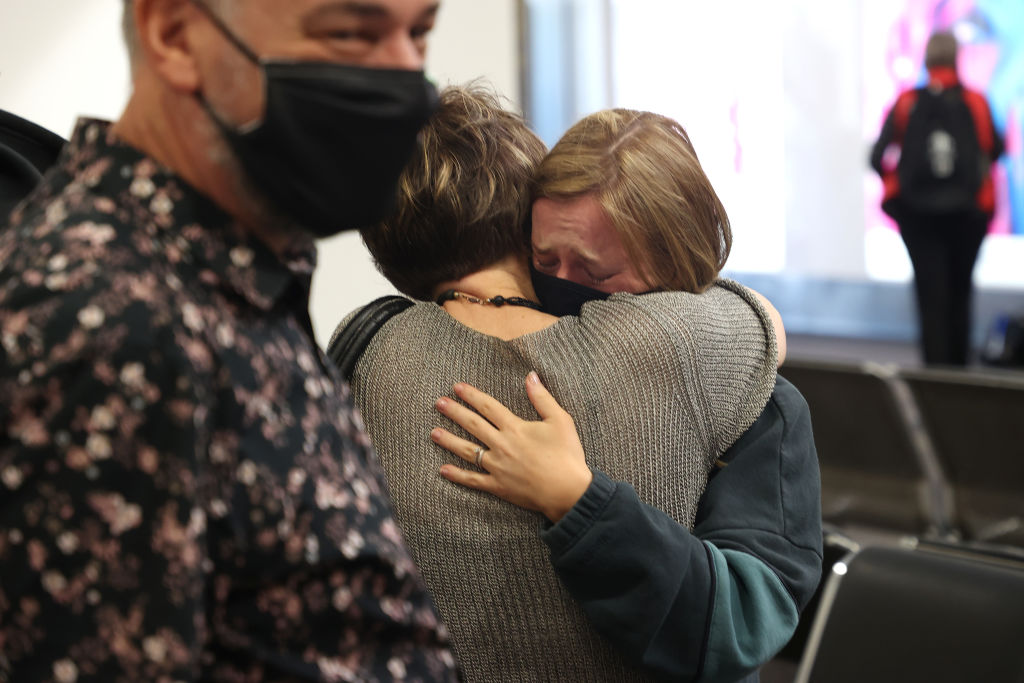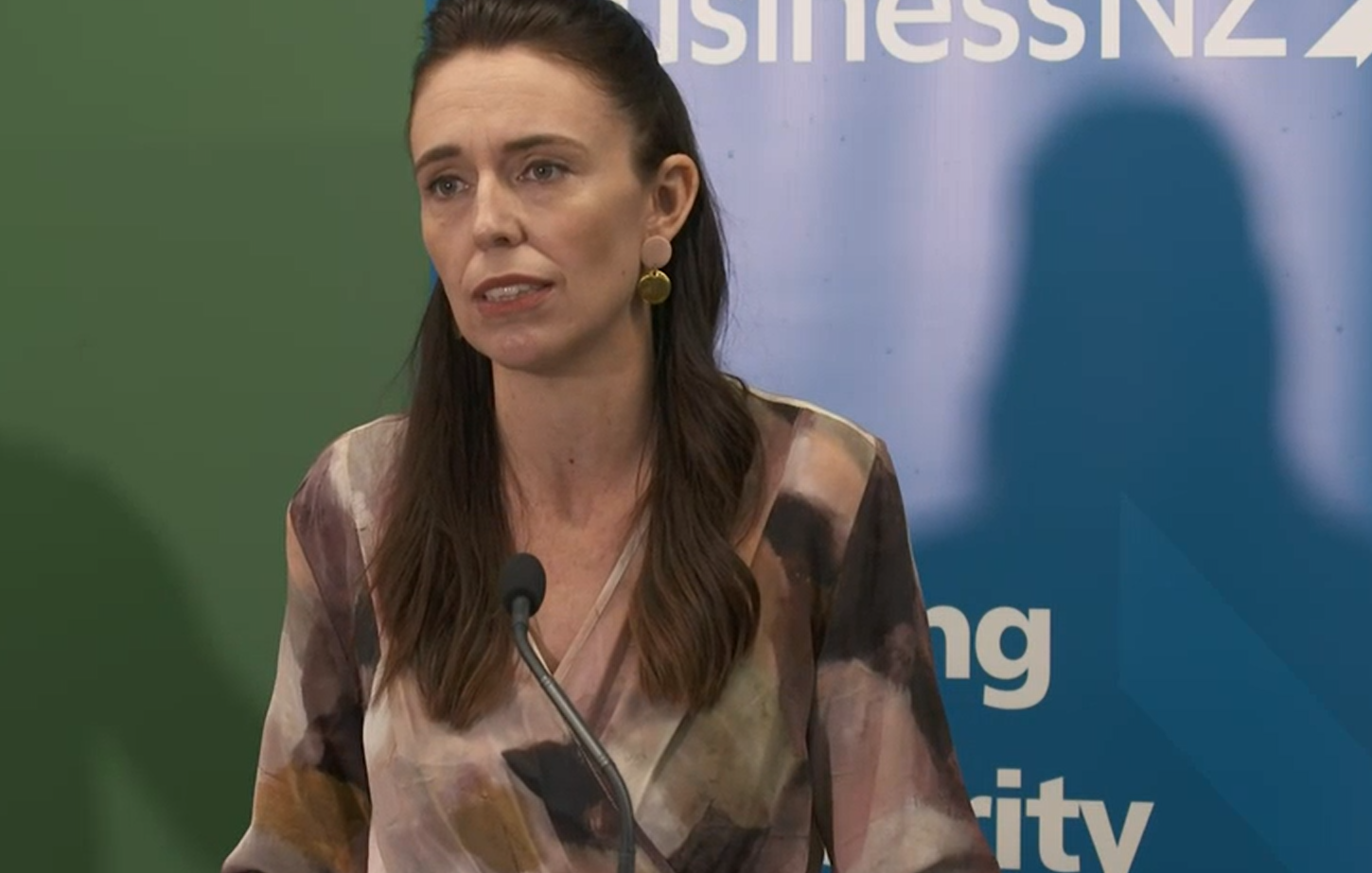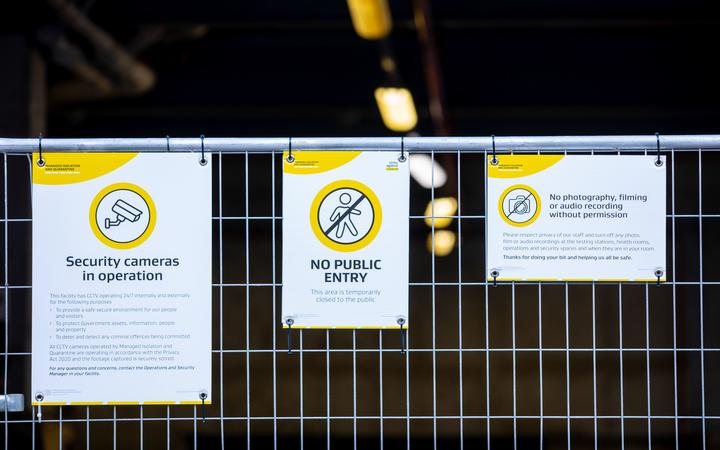The Government is reopening the border – starting with Kiwis coming from Australia from February 27 - with the MIQ system to end for all but "high-risk" unvaccinated travellers.
Everyone else will be allowed to self-isolate as the border reopens in five stages, Prime Minister Jacinda Ardern has confirmed.
In a speech to Business NZ in Auckland, Ardern said there was life before, and there will be life after, Covid.
"We are well on our way to reaching that destination. But we are not quite there yet."
Ardern said today she would outlay the path to a "new normal".
She began by recalling the "early days of the Covid pandemic".
"I recall the emergency cabinet meeting where we discussed the very first border closure – which in the first stages was country by country. I remember the moment we decided to require very traveller to self-isolate.

Ardern says it is "easy to hear the word MIQ and immediately associate it with heartache".
"There is no question, that for New Zealand, it has been one of the hardest parts of the pandemic.
"But the reason that it is right up there as one of the toughest things we have experienced, is in part because large-scale loss of life is not.
"The anguish of MIQ has been real, and heartbreaking. But the choice to use it, undeniably saved lives.
"MIQ meant not everyone could come home when they wanted to. But it also meant that Covid could not come in when it wanted to, either."
MIQ had given New Zealand time to "build our defences", including getting vaccinated and setting up public health measures, get children vaccinated and keep the economy strong.
The markers of success had been hard earned by every Kiwi here and abroad, she said.

Ardern says now though with the community better protected was time to move again.
The 5 step plan
Fully vaccinated Kiwis and other currently eligible travellers from Australia will be able to travel to New Zealand from 11.59pm Sunday 27 February, and instead of going into MIQ, will be able to self-isolate.
In step 2, two weeks later on Sunday 13 March, fully vaccinated New Zealanders and other currently eligible travellers from the rest of the world will also be able to travel into New Zealand without going through MIQ.
"The two weeks between each of these steps has been requested by public health advisors to give time for our systems to adjust for the likelihood of more cases in our community, and for our border systems to keep scaling up in the safest way possible," Ardern said.
At step 2, at 11.59pm on Sunday March 13, there will also be an expanded border exception for critical workers, and skilled workers earning at least 1.5 times the median wage, who will also be eligible to enter New Zealand, along with highly skilled workers' family members who may have been separated from their loved ones.
"This means that health workers, farm managers, horticultural workers, tech sector professionals, those working for accounting services, in education and construction, will all be eligible to enter New Zealand, and self-isolate for a short period and then go about their business.
"Adding to the more than 17,000 critical workers who have already come to New Zealand since our borders closed."
Working Holiday Schemes will also reopen in stages from step 2, Ardern said.
Step 3 begins from 11.59pm 12 April.
"Here we further extend our border extension to include a large international student cohort of up to 5,000 students for entry ahead of semester 2 and temporary visa holders who still meet relevant visa requirements.
"Step 4 sees the biggest expansion yet, and includes our Australian cousins and all other visitors and other visitors and business travellers who can normally enter New Zealand without a visa.
"This stage is likely to begin when we have much larger case numbers than we have now. For planning, we anticipate this stage will begin no later than July.
"I want to place strong emphasis on this being the latest we expect this to begin. There is a high likelihood of this date coming forward as we progress through the next stage of the pandemic."
From July those on the new Accredited Employer Work Visa will open, including for workers offshore.
At this point, the critical worker border exception will be removed.
The new work visa will be mainly available to workers earning over the median wage as part of the Immigration Rebalance changes.
The Minister of Immigration will have more to say about this and other immigration rebalance measures soon, Ardern said.
Step 5 begins in October and includes all other visitors and students who require a visa to enter New Zealand, with normal visa processing resuming.
On isolation requirements, Ardern said travellers will be asked to follow "broadly the same requirements we have in New Zealand for close contacts at the time of their travel".
This was due to the likelihood of coming into contact with Omicron on their journey.
"That means currently, returning New Zealanders will need to self-isolate for 10 days. But as the isolation period drops for close contacts here in New Zealand, as it does in phase two of our Omicron response, so too will returnees only need to isolate for 7 days."
On testing, all arrivals will be given three rapid antigen tests upon arrival at the airport, to take home.
One for use on day 0/1, and one for use on day 5/6, with one extra for backup.
"That gives us the best chance of identifying cases that have come across the border," Ardern said.
"If a positive result is returned at any point, returnees will be asked to get a follow up PCR test at a community testing station.
"That will help us to monitor any possible variants that may emerge. It will also help us assess when it's safe to lift self-isolation requirements."
While many will celebrate today's reopening, others will feel anxious about the resumption of people across our border, Ardern said.
"But here are the safeguards, we will be as boosted as possible at the end of February, the phasing reduces the risk of a surge in cases, and travellers will be testing and isolating, with MIQ remaining for the unvaccinated.
"This means we will know quickly if a traveller has the virus including any new variants."
Self-isolation would be continually monitored, she said.
"The strong advice from our public health officials is that we still need it to manage our way through Omicron, but there will be a time in the not too distant future when that will not be the case."
Opening back up in this managed way balances inflows of travellers so people can reunite and fill our workforce shortages, while also ensuring our healthcare system can manage an increase in cases, Ardern said.
"After all, our strategy with Omicron is to slow the spread, and our borders are part of that.
"As for MIQ, it will continue to be used for high-risk travellers such as those who are unvaccinated."

Winding up MIQ
The Defence Force will begin withdrawing from MIQ, with some hotels returning to traditional use to support the return of our tourists.
A core quarantine capacity will be maintained that can be scaled up as required, which will form the basis of a future National Quarantine Service.
Ardern thanked the MIQ workers a "very special group of people", who for almost two years have welcomed home over 200,000 Kiwis and critical workers, and 3600 people who have had Covid-19.
"That's more than the population of Napier, Masterton, Invercargill, Whanganui, Wānaka and Ōtaki put together."
"You worked at the frontline of Covid when there was no way to protect yourself other than rigorous infection controls – some of which meant you gave up your normal lives to protect others. I can't imagine the burden that presented."
"Thank you. You made all of us safe at a time when we needed you most. And we owe you a debt of gratitude."
Focus on the economic recovery
Reconnecting New Zealand was more than the family and friends who will be reunited, but also a critical element in our plan for a high wage, low carbon economy, Ardern said.
"The New Zealand economy has shown remarkable resilience through Covid-19, and I am determined that we will build on this base to deliver prosperity and security to all New Zealanders."
Ardern also announced she will lead trade delegations and trade-supporting visits into four key markets this year – Australia, Asia, the United States and Europe.
New Zealand is in demand. Our exports are at record highs, people want to live and work here, international students want to study here, our friends and whānau want to return.
"Today's reconnecting plan will help grow an already strong export base, bring in new skills, address the shortages standing in the way of growth, and build new connections with the world."
The plan didn't mean a return to life "before Covid", Ardern said.
"We can be better than that."
Ardern also referred to the reliance on unsustainable reliance on temporary migrant labour.
"We have a chance to do things differently."
"A recovery where our focus is on creating higher wage jobs through lifting our productivity, growing our skills and investing in our innovation.
"It is a future where the environmental challenge of climate change is matched by the economic opportunities of low emissions technology and regenerative agriculture."
Ardern said that work had already started, referencing Covid economic support schemes and investment in infrastructure.
"In 20 years' time at this period in our country's history, I don't want people to just see Covid. I want them to see an economy and country that was fundamentally repositioned to become more sustainable and resilient and taking on the challenges of poverty, inequality, climate change and mental health, problems the world is grappling with."
Reopening to the world
The early moves to free up travel for New Zealanders will ease the pressure on MIQ.
It is likely the home isolation periods for those travellers will mirror those set for close contacts of Omicron cases domestically.
The isolation period is now 10 days but will change to one week when Omicron is more widespread in phase 2 of the pandemic response plan.
Air New Zealand's website now shows the requirement for MIQ has been removed after February 27, with transtasman flights available for $400 from that date.
Last November's plan to reopen the borders in a staged approach from mid-January was put on hold shortly before Christmas, as Omicron proliferated overseas.
Previously, the plan was for people from Australia to be allowed to isolate at home for seven days after January 16, and those from other countries from February 13.
All fully vaccinated foreign travellers would have been able to travel from April 30.
However, on December 21, the start date was pushed out to late February but that was under review, depending on Omicron.
The MIQ lottery system and its limited spaces caused increasing headaches for the Government, with pregnant TV journalist Charlotte Bellis the latest of a string of Kiwis in tricky situations and struggling to get home.
Bellis has confirmed she will return to New Zealand in early March to give birth to her baby girl, after accepting an emergency spot in MIQ.
At a press conference yesterday, Ardern said there would be multiple people in distressing situations struggling with MIQ - but on the flip side, the system had saved lives.
Today's border news will also follow a move to shorten the gap between second vaccine doses and boosters from four months to three, in a bid to ensure immunity improved before widespread Omicron community transmission.












